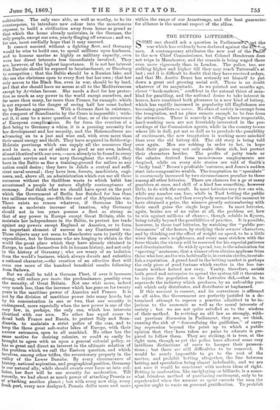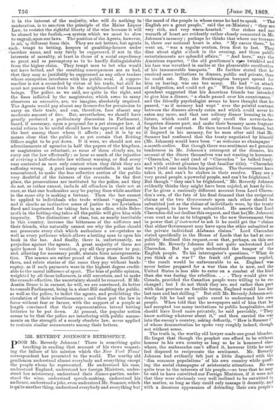THE BETTING LOTTERIES:-.,..
SOME one should ask a question in Parliamea‘ war which has evidently been declared against the men. A contemporary attributes the new zeal of the 7111M. to the new Chief Commissioner, but Colonel Henderson does
not reign in Manchester, and the crusade is being waged there even more vigorously than in London. The police, too, are striking higher and higher till they may reach Tattersalrs at last ; and it is difficult to doubt that they have received orders, and that Mr. Austin Bruce has seriously set himself to Put down a great and growing social evil. There is no doubt whatever of its magnitude. As we pointed out months ago, clever "book-makers," confident in the natural thirst of man kind for gambling, and the national desire to take interest in horses, have combined both pleasures in a new kind of lottery, which has rapidly increased in popularity till Englishmen are becoming gamblers en masse. No class of society is exempt from the temptation, and no place remote enough to be free from the attraction. There is scarcely a village where respectable, hard-working men are not feverishly interested in the proceedings of the Commission agents, while in the country towns where life is dull, yet not so dull as to preclude the possibility of excitement, the new temptation is working more mischief than ever the old lottery did. The old story is being told over again. Men are robbing in order to bet, in hope that their gains may not only make them rich, but protect their characters besides. The profits of petty trade or the salaries derived from monotonous employments are despised, while on every side stories are told of Smith's "lucky haul," Brown's profitable 'cuteness, and Jones's sudden start into comparative wealth. The temptation to "speculate" is enormously increased by two circumstances peculiar to these among all other lotteries. There are chances for a se at many
gamblers at once, and skill of a kind has something, however
little, to do with the result. In most lotteries very few can win, while any number can lose, while in Turf betting the public favourite may win, and then everybody seems for the moment to have obtained a prize, the winners greatly outnumbering with their small gains the single large loser. In most lotteries, again, brains are of no value at all, the problem set, how to win against millions of chances, though soluble in figures, being totally beyond the possibilities of practice. It is possible, however, in these turf lotteries, by watching the "public per formances" of the horses, by studying their owners' characters, and by thinking out the effect of weight on speed, to be a little wiser than one's neighbours, and every man stricken with the fever thinks the victory will be reserved for his especial patience and discrimination. So widely spread, too, is the admiration for "sporting" acuteness, that a winner often obtains applause from
those who lose, and to win habitually is. in certain circles, to establish a reputation. A grand haul in the betting market is perhaps
the only piece of good fortune which excites in the less for tunate neither hatred nor envy. Vanity, therefore, assists both greed and enterprise to spread the system till it threatens
to injure the population as the Lotteries did,—that is, to supersede the industry which produces, by an unhealthy pursuit which only distributes, and distributes at haphazard.
If this account is correct, and its correctness is affirmed on all sides, the Government are perfectly justified in a de
termined attempt to repress a practice admitted to be injurious to the economic as well as the moral interests of society ; but we are not quite satisfied as to the wisdom of their method. In reviving an old law so strongly, without previous discussion in Parliament, they are, we think, running the risk of "demoralizing the guillotine," of carrying repression beyond the point up to which a public opinion that they have taken no pains to educate is prepared to follow them. They are striking, it is true, at the right men, though as yet the police have allowed some very invidious distinctions of caste to hamper their prosecutions ; but there are still difficulties to be removed. It would be nearly impossible to go to the root of the matter, and prohibit betting altogether, the line between betting and speculation being almost indefinable, and we are not sure it would be consistent with modern ideas of right. Betting in moderation, like cardplaying or billiards, is a somewhat frivolous method of purchasing excitement, only to be reprehended when the amount so spent exceeds the sum the spender ought to waste on personal gratification. To prohibit t the it in the interest of the majority, who will do nothing in moderation, is to sanction the principle of the Maine Liquor Law, to restrict the rightful liberty of the wise because it will be abused by the foolish,—a system which we must be slow to engraitapon our laws. The position of the Agents, however, is _wit; Vy. different from this. They are not betters, but agents .0,6, tempt to betting, keepers of gambling-houses under 4inother name, and may fairly be suppressed, if not in the interests of morality, at least in those of a social expediency so great and so peremptory as to be hardly distinguishable from the higher claim. They tempt men to bet who would not have betted, and the resulting consequences are so bad, that they may as justifiably be suppressed as any other traders whose occupation interferes with the public weal. A coppersmelter is not a scoundrel by virtue of his trade, but still he must not pursue that trade in the neighbourhood of human beings. The police, as we said, are quite in the right, and the fines inflicted by the magistrates, which seem to many observers so excessive, are, we imagine, absolutely required. The Agents would pay almost any licence-fee for permission to carry on their trade, and can, therefore, face almost any moderate amount of fine. But, nevertheless, we should have greatly preferred a preliminary discussion in Parliament, based, if necessary, upon a proposal for a yet stronger law. A social reform to be useful should have the approval at least of the best among those whom it affects ; and it is by no means clear that the public is as yet certain that Betting Offices ought to be put down. If it were, we should not see advertisements of agencies in half the papers of the kingdom, or magistrates so reluctant, as some of them clearly are, to carry out the law effectually ; or hear so much of the injustice of reviving a half-obsolete law without warning, or find every case contested as men only contest when they think they are suffering wrong. A good many causes contribute, it must be remembered, to make the less reflective section of the public very doubtful of the fairness of the crusade. In the first place, the prosecutions are instituted by the police, and they do not, or rather cannot, include all offenders in their net at once, so that one bookmaker may be paying fines while another in the same city is making a fortune. Then the law cannot be applied to individuals who trade without "appliances," and it shocks an instinctive sense of justice to see Leviathan fined and imprisoned for taking bets in an office, while Behemoth in the betting-ring takes all the public will give him with impunity. The distinctions of class, too, so nearly inevitable in this country, increase the bitterness of the sufferers and their friends, who naturally cannot see why the police should not prosecute every club which authorizes a sweepstakes as well as every pothouse which allows a betting man to open his book in the bar. And finally, there is, unfortunately, no prejudice against the agents. A great majority of them are quite honest in their vocation, pay all they promise to pay, and, allowing for necessary profit, abstain from misrepresentation. The masses are rather proud of them than hostile to them, and relate stories of the sums they pay without bankruptcy, as if such payments were in the highest degree creditable to the moral influence of sport. The bias of public opinion, weighted by all these influences, is still uncertain, and to make the crusade effective, the uncertainty should be removed. If Mr. Austin Bruce is in earnest, he will, we are convinced, do better to consult Parliament, bring in a short Bill enabling the public, as well as the police, to indict the agents, and prohibiting the circulation of their advertisements ; and then put the law in force without fear or favour, with the support of a people at length convinced that their representatives intend betting lotteries to be put down. At present, the popular notion seems to be that the police are interfering with public amusements on the strength of a nearly obsolete law, never applied to restrain similar amusements among their betters.































 Previous page
Previous page